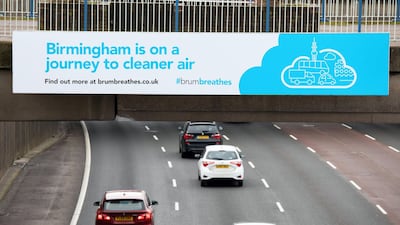The introduction of a long-delayed clean air zone in Britain’s second city of Birmingham started chaotically on Tuesday after plans to charge motorists were postponed because of widespread ignorance of the scheme.
The project, aimed at reducing traffic and improving air quality, was already rescheduled from 2020 because of the Covid-19 pandemic. But officials announced on Tuesday's launch day that the payment scheme would be delayed for another two weeks.
Under the clean air project, drivers of the most-polluting cars will have to pay an £8 ($11.30) fee to drive into the city’s centre, while those with larger vehicles pay £50.
It is one of a number of schemes being introduced or under consideration across British cities to tackle congestion, pollution and climate change.
The car-reduction scheme is part of an ambitious project to redesign the city of 1.2 million people to persuade citizens to swap driving for public transport, cycling or walking, and re-energise the businesses at its heart.
Some shoppers and business owners are opposed to the scheme, but its champions believe it is essential to change habits.
A quarter of all car journeys are for less than a mile in Birmingham where air pollution contributes to 900 adult deaths a year, according to council documents.
Waseem Zaffar, the lead councillor behind the scheme, denied that technical problems were behind the latest delay but said not enough people knew about the grants on offer to scrap older vehicles and other financial incentives to promote greener travel.
He said the Labour-run council, the party in opposition nationally, had learned from another scheme launched this year in Bath, south-west England, where most people who didn’t pay the charge were unaware of the system.
Mr Zaffar said the decision to postpone the project was not made on Tuesday.
“We didn’t want to spend all our time chasing payments,” he said. “This is a massive project, a massive change to the life of people in Birmingham.
“I don’t want people’s money – I want them to ‘green up’ their journeys. My aim is to reduce pollution.”
But critics seized on the latest delay as a sign of deeper problems with the scheme. “Beggars belief that Labour’s flagship policy for Birmingham stumbles on launch day,” said Gary Sambrook, an MP for the ruling Conservative Party.
Motoring organisation the AA said the project would affect 100,000 vehicle owners, with the financial burden falling on poorer and younger drivers. Its president Edmund King said such schemes were “very blunt tools that create a tax burden for low-income families and workers”.
'We’re going to lose lots of clients'
Arash Mohammadi, whose city-centre tailor shop looks out on one of the busiest roads into Birmingham, told The National that traffic was only starting to return to usual levels after Covid-19 restrictions.
Before coronavirus, he said traffic outside his shop was “rammed for three hours and nothing moves”.
After losing 65 per cent of his takings during the pandemic, he is worried that the new scheme could compound the pain for himself and other business owners who depend on passing motorists for trade. “We’re going to lose lots of clients,” he said.
Authorities in the medieval city of York and the Scottish capital of Edinburgh are among those considering ways to keep cars out of their historic centres, while the south coast city of Brighton wants to end congestion and parking problems.
A similar scheme launched in London in April 2019 led to the number of older, more polluting vehicles being cut by 65 per cent after a charge was introduced. Total traffic volume was cut by 9 per cent.
The scale of London’s problem was highlighted last year when a coroner made legal history by ruling that air pollution was a cause of the death of a girl, 9, in the city.
Birmingham is also the centre of Britain’s broader ambitions to spark a post-Brexit boom through new transport and communications infrastructure. The high-speed rail project that links London with northern cities Manchester and Leeds is to go through Birmingham.
The project – High-Speed Two (HS2) – is the centrepiece of the UK's efforts to drive prosperity to northern cities that are traditionally the poor economic cousins of London.
Voters from the North, considered a stronghold of the opposition Labour Party, switched in large numbers to Prime Minister Boris Johnson’s right-of-centre Conservative Party in the 2019 general election that delivered him a large majority. He has promised to deliver economic benefits to the regions to repay their support.
Mr Johnson seeks to position the UK as a leader in tackling climate change. Britain is the first major economy to set a legally binding target to reach net zero emissions by 2050 and has pledged to ban the sale of new petrol and diesel cars by 2030.
Andy Street, the ruling party mayor of the West Midlands region which includes Birmingham, said: “What we must not lose sight of … is the fact the West Midlands is in the midst of a climate emergency and air pollution plays a critical role in tackling that.”


